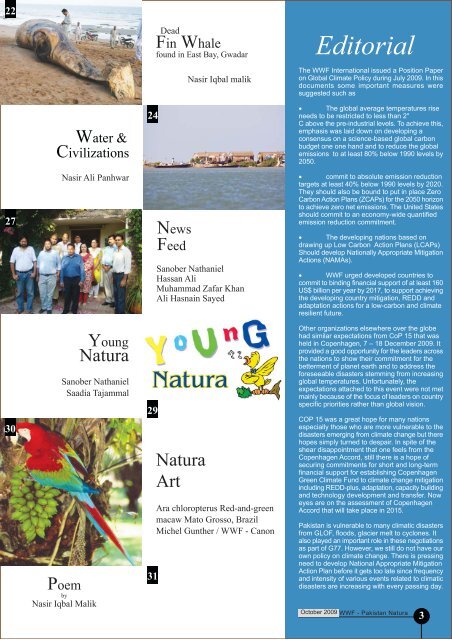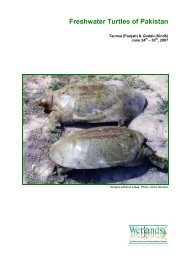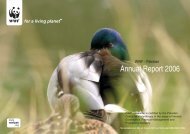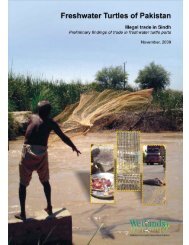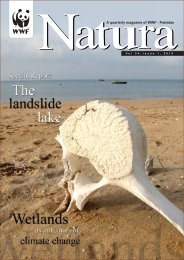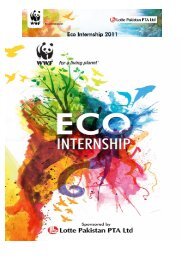Nasir Iqbal Malik - WWF - Pakistan
Nasir Iqbal Malik - WWF - Pakistan
Nasir Iqbal Malik - WWF - Pakistan
- TAGS
- nasir
- iqbal
- malik
- pakistan
- wwfpak.org
You also want an ePaper? Increase the reach of your titles
YUMPU automatically turns print PDFs into web optimized ePapers that Google loves.
22<br />
27<br />
30<br />
Water &<br />
Civilizations<br />
<strong>Nasir</strong> Ali Panhwar<br />
Poem<br />
by<br />
<strong>Nasir</strong> <strong>Iqbal</strong> <strong>Malik</strong><br />
Young<br />
Natura<br />
Sanober Nathaniel<br />
Saadia Tajammal<br />
24<br />
29<br />
31<br />
Dead<br />
Fin Whale<br />
found in East Bay, Gwadar<br />
News<br />
Feed<br />
<strong>Nasir</strong> <strong>Iqbal</strong> malik<br />
Sanober Nathaniel<br />
Hassan Ali<br />
Muhammad Zafar Khan<br />
Ali Hasnain Sayed<br />
Natura<br />
Art<br />
Ara chloropterus Red-and-green<br />
macaw Mato Grosso, Brazil<br />
Michel Gunther / <strong>WWF</strong> - Canon<br />
Editorial<br />
The <strong>WWF</strong> International issued a Position Paper<br />
on Global Climate Policy during July 2009. In this<br />
documents some important measures were<br />
suggested such as<br />
· The global average temperatures rise<br />
needs to be restricted to less than 2°<br />
C above the pre-industrial levels. To achieve this,<br />
emphasis was laid down on developing a<br />
consensus on a science-based global carbon<br />
budget one one hand and to reduce the global<br />
emissions to at least 80% below 1990 levels by<br />
2050.<br />
· commit to absolute emission reduction<br />
targets at least 40% below 1990 levels by 2020.<br />
They should also be bound to put in place Zero<br />
Carbon Action Plans (ZCAPs) for the 2050 horizon<br />
to achieve zero net emissions. The United States<br />
should commit to an economy-wide quantified<br />
emission reduction commitment.<br />
· The developing nations based on<br />
drawing up Low Carbon Action Plans (LCAPs)<br />
Should develop Nationally Appropriate Mitigation<br />
Actions (NAMAs).<br />
· <strong>WWF</strong> urged developed countries to<br />
commit to binding financial support of at least 160<br />
US$ billion per year by 2017, to support achieving<br />
the developing country mitigation, REDD and<br />
adaptation actions for a low-carbon and climate<br />
resilient future.<br />
Other organizations elsewhere over the globe<br />
had similar expectations from CoP 15 that was<br />
held in Copenhagen, 7 – 18 December 2009. It<br />
provided a good opportunity for the leaders across<br />
the nations to show their commitment for the<br />
betterment of planet earth and to address the<br />
foreseeable disasters stemming from increasing<br />
global temperatures. Unfortunately, the<br />
expectations attached to this event were not met<br />
mainly because of the focus of leaders on country<br />
specific priorities rather than global vision.<br />
COP 15 was a great hope for many nations<br />
especially those who are more vulnerable to the<br />
disasters emerging from climate change but there<br />
hopes simply turned to despair. In spite of the<br />
shear disappointment that one feels from the<br />
Copenhagen Accord, still there is a hope of<br />
securing commitments for short and long-term<br />
financial support for establishing Copenhagen<br />
Green Climate Fund to climate change mitigation<br />
including REDD-plus, adaptation, capacity building<br />
and technology development and transfer. Now<br />
eyes are on the assessment of Copenhagen<br />
Accord that will take place in 2015.<br />
<strong>Pakistan</strong> is vulnerable to many climatic disasters<br />
from GLOF, floods, glacier melt to cyclones. It<br />
also played an important role in these negotiations<br />
as part of G77. However, we still do not have our<br />
own policy on climate change. There is pressing<br />
need to develop National Appropriate Mitigation<br />
Action Plan before it gets too late since frequency<br />
and intensity of various events related to climatic<br />
disasters are increasing with every passing day.<br />
October 2009 <strong>WWF</strong> - <strong>Pakistan</strong> Natura<br />
3


